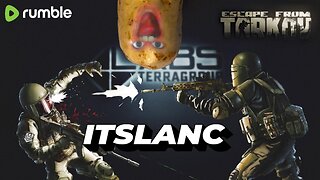Premium Only Content

Corbyn Won’t Be Drawn on Being Anti-Zionist — And Why It Matters
Right, so once again, Jeremy Corbyn is under fire. This time the spark has not been a new confected scandal, an implied policy mistake, or even an offhand remark — it was his refusal to make a certain remark, a refusal to say the words “I am anti-Zionist.” This single moment, which came during a pro-Palestinian rally, not that that seems to have meant much at all to some people, was seized upon by critics across the political spectrum because they will latch onto anything, we know that, or by now we damn well should. Some activists accused Corbyn of capitulation, while others suggested that his refusal to wear the label “anti-Zionist” represented a failure to take a firm stand against Israel’s policies. The media quickly amplified the controversy, portraying it as evidence of a deepening division within the left. The left is getting split again they excitedly bleat, frothing at the mouth at the prospect of getting Jez again.
This scenario feels very familiar, it is because it has happened before, but are you stupid enough to fall for it a second time, given what leadership that has resulted in previously, from Theresa May, to Boris Johnson, Rishi Sunak and Keir Starmer. The same trap was used to undermine Corbyn during his leadership of the Labour Party. The conflation of anti-Zionism with antisemitism, and the relentless attack on Corbyn’s record of solidarity with Palestinians, destroyed his leadership. Yet, this cycle continues, and once again, the left is being divided over semantics while Israel’s violence continues unabated and all of us are now much more in line with Corbyn’s Palestine solidarity record. The question now is not whether Corbyn will adopt a specific label — it is about understanding the trap he faces, that he hasn’t walked into and why the word Zionism itself is a political weapon that distracts from the real issue at hand: Israel’s ongoing genocide and apartheid state system.
Right, so the central problem with the debate surrounding Zionism is that the term has evolved into a weapon used to silence criticism of Israel. It was not always a term synonymous with the Israeli state, but today it has been hijacked to describe Israel’s right to exist as a Jewish state, and at the expense of Palestinians. The first step in understanding why Corbyn would be cautious in embracing this label is to explore the historical roots of Zionism and how the word has been manipulated in modern political discourse and frankly I’m as guilty of anybody of doing this, which is why I made this video, I’ve learnt from researching this as much as anything else.
When Theodor Herzl coined the term Zionism in the late 19th century, it was understood as a movement for Jewish national revival. Herzl himself never imagined that the movement would lead to a settler-colonial state in Palestine. Initially, Herzl’s vision was about providing a safe haven for Jews in the face of European persecution, but the location was not set in stone back then. In his early writings, Herzl suggested that Argentina could be an ideal place for Jewish settlers, a region with fertile land and few inhabitants.
In the early 20th century, other Zionist leaders entertained various alternative proposals. The “Uganda Scheme” proposed by the British colonial government offered the Mau Plateau in East Africa, which was sparsely populated and available for settlement. The Zionist Congress debated it seriously, but ultimately rejected it, not on the grounds of humanitarian concerns, but because Palestine was seen as the only true homeland for Jews, the Promised Land and all of that.
Moreover, other forms of Zionism, such as cultural Zionism, focused on the revival of Jewish culture and language rather than the establishment of a state. Leaders like Ahad Ha’am championed a Jewish cultural renaissance without the need for political sovereignty. Binational Zionism, supported by thinkers such as Martin Buber and Judah Magnes, proposed that Jews and Arabs live together peacefully in a single democratic state, what many of us are advocating for now isn’t it? A single state solution. These strands of Zionism envisioned a more inclusive model of Jewish national identity, one that could coexist with the existing Palestinian population.
Today, however, Zionism is equated almost exclusively with the idea of a Jewish state in Palestine — a project that has been married to the idea of Israel in ways that erase the earlier, more diverse visions. This narrowing of the term has led to a situation where any criticism of Israel is instantly labelled as antisemitism, regardless of the substance of the criticism.
The transformation of Zionism therefore into a weapon can be traced to the rise of Israel and its subsequent political efforts to define what Zionism means. Israel’s defenders, particularly its political lobbyists, have spent decades conflating anti-Zionism with antisemitism. This conflation is embedded in the examples within the IHRA definition of antisemitism, which deems certain forms of criticism of Israel as inherently antisemitic, which is a false equivocation. As a result, the term Zionism has become a lightning rod — an easy way to label critics of Israel as enemies of Jews. The reality is that rather than offering clarity in criticism of Israel, it is still muddying the waters.
Now the political strategy behind this is not accidental either. The Israeli state and its international defenders have long used the weaponisation of Zionism to silence any form of meaningful criticism. By making the debate about labels, the conversation about Israel’s human rights abuses is derailed. Zionism becomes the issue, not Israel’s occupation, not the killing of civilians, not the denial of Palestinian statehood. This is precisely why in my view Corbyn hesitated to adopt the label of anti-Zionist — because doing so would play into the hands of those who want to make the entire debate about terminology rather than the actual political and humanitarian crisis on the ground in Palestine.
In this sense, the focus on Zionism is not just politically loaded — it is a deliberate distraction. Those who demand that Corbyn call himself anti-Zionist are missing the point. By focusing on words, they are playing the game Israel wants them to play, and in doing so, they allow Israel’s policies to continue without real scrutiny.
One of the most compelling arguments against the idea that Zionism and Israel were inevitable is the historical reality that other Jewish homelands could have been established without dispossessing the Palestinian population, or in fact any population. In fact, alternative sites for a Jewish homeland were seriously proposed and could have been pursued without the violence and displacement that marked the establishment of Israel and the decades of occupation and violence seen ever since.
Herzl’s initial vision of a Jewish homeland was Argentina. At the time, Argentina was promoting immigration, particularly European settlers, and had vast stretches of unused land. Argentina’s government was offering land grants to European immigrants to help develop the country’s economy. Jews, like Italians and Germans, were encouraged to settle in the region. It is worth noting that Argentina had already undergone its own violent “Conquest of the Desert,” during which indigenous populations were displaced. However, the establishment of a Jewish homeland in Argentina would not have required the removal of an existing, entrenched national population in the way that Palestine did.
Had Herzl’s proposal been accepted, the history of Jewish settlement might have unfolded without the mass displacement of Palestinians. The argument that Palestine was the only option for Jewish survival simply does not hold when we examine the history of alternative proposals like Argentina.
The “Uganda Scheme” of 1903 proposed establishing a Jewish colony in the Mau Plateau in East Africa. The region was sparsely populated at the time, and Britain had already colonised it. The plan was seen by many Jews, particularly in Eastern Europe, as a potential refuge from the pogroms and discrimination they faced in Russia and Eastern Europe. However, the scheme was rejected in 1905 by the Zionist Congress, which chose to focus exclusively on Palestine. The Uganda Plan was not rejected because of its humanitarian concerns but because of the symbolic power of Palestine for the Zionist movement.
Had the Uganda Scheme been pursued, it would have avoided the conflicts and displacement associated with the founding of Israel. The land was available for settlement, and its indigenous population was not numerous enough to make coexistence impossible. Once again, the tragedy of Palestine was not an inevitability; it was a political choice.
In the 1930s, the Soviet Union created the Jewish Autonomous Oblast in Birobidzhan, a region in the Russian Far East. This was an attempt to provide Jews with autonomy within the Soviet Union, and it was officially recognised as a Jewish homeland. The area was remote, underdeveloped, and sparsely populated, making it an ideal site for settlement. While it faced challenges, including harsh climatic conditions and Stalinist repression, the project proved that Jewish autonomy could be pursued without the need for violent conflict or the displacement of a native population.
Birobidzhan demonstrates that alternative models for Jewish self-determination existed. These alternatives, such as Argentina, Uganda, or Birobidzhan, would have allowed Jews to establish a homeland without the dispossession of Palestinians.
Another alternative that could have avoided the tragedy of Palestine was the Alaska proposal of 1939, known as the Slattery Report. This plan suggested resettling Jewish refugees in underdeveloped parts of Alaska. The US government proposed offering land to 10,000 Jewish refugees per year for five years, providing them with a safe haven from Nazi persecution. This proposal was never implemented, but it underscores the fact that viable alternatives were available. The Alaska plan would have provided a sanctuary for Jews without requiring the expulsion or displacement of another population.
Had the Alaska proposal been adopted, Jewish refugees could have settled in a safe and underpopulated region without the violent consequences that unfolded in Palestine.
It is crucial to understand that Zionism, as a political movement, did not always equate to support for Israel as we know it today. Early Zionists, including cultural Zionists and binationalists, envisioned a different kind of Jewish homeland — one that did not necessitate the exclusion of the Palestinian people. Cultural Zionism, advocated by thinkers like Ahad Ha’am, focused on the spiritual and cultural revival of the Jewish people, not on creating a state at all. Binational Zionism, championed by figures like Martin Buber and Judah Magnes, envisioned a shared democratic homeland for both Jews and Arabs.
Even today, there are Zionists who oppose the policies of the Israeli state. Liberal Zionist groups like J Street, based in the United States, continue to support the idea of a Jewish homeland in Palestine but are deeply critical of Israel’s treatment of Palestinians. These Zionists do not support the policies of occupation and apartheid and are calling for a two-state solution, though I don’t see how that position can possibly hold any longer.
However, for the most part, Zionism has been reduced to the belief in the establishment and protection of Israel as a Jewish state. This reduction has led to the silencing of critical voices within the Jewish community and has turned the debate into an all-or-nothing proposition. To be anti-Zionist is seen as anti-Jewish by Israel and to be Zionist is to support Israel’s policies, even if those policies are oppressive and violent. This is a disgusting slur actually in and of itself when so many Jewish people are anti-Zionist themselves, opposed not necessarily just to Israel, again, the problem with using this word, but to the notion of a Promised Land, when they believe that can only happen by divine intervention. So this oversimplification has created a barrier to meaningful dialogue and solidarity and there has to be that to move forward and I appreciate it does require Israeli leadership to solve this issue, rather than purely embark on ethnic cleansing as the current administration is very much doing. But Corbyn has always been about talking to both sides as a necessity and we respected him for that before, so why not now?
In the British context, the word Zionism has been weaponised to silence critics of Israel and to tear apart the left. The most glaring example is the use of the IHRA definition of antisemitism, which has been used to smear anyone who criticises Israel as antisemitic. This definition conflates anti-Zionism with hatred of Jews, effectively shutting down any discussion of Palestinian rights or Israeli crimes.
Corbyn’s Labour Party faced relentless smears, not for policy failures, but for supporting Palestinian rights. The debate was not about the occupation, not about apartheid, not about genocide — it was about a word. In 2018, Corbyn’s attendance at a memorial in Tunisia for victims of an Israeli bombing in 1985 was spun into a scandal. He was accused of “honouring terrorists” of the Munich bombing for laying a wreath at the memorial, even though they were buried in Libya, not Tunisia and because Israel won’t permit right to return, this memorial was erected in Tunis. It was a total distortion of the facts — it was an attempt to erase Corbyn’s decades-long commitment to peace and justice for Palestinians at a time when far too many of us were still so terribly unaware of the realty of life in Palestine under Israeli occupation, it taking a genocide to open more of our eyes to that.
Even when Corbyn expressed concern about Israel’s blacklisting of the Palestine Solidarity Campaign, it was framed as evidence of extremism. The smears never stopped. Each time, the left was baited into defending itself over semantics, and the core issue of Israel’s human rights violations, as well as everything else Corbyn stood for even in domestic policy, was sidelined.
Jeremy Corbyn’s record of solidarity with Palestine is unmatched in British politics, which makes those attacking him now for not saying one word all the wetter. Since the 1980s, he has been a patron of the Palestine Solidarity Campaign. In 2018, he pledged that a Labour government would immediately recognise Palestine and suspend arms sales to Israel. He has consistently spoken out against Israel’s military actions, demanded ceasefires during Israeli assaults on Gaza, and condemned Israel’s policies of apartheid.
Corbyn’s commitment to Palestinian rights should not be in question. His critics may harp on his refusal to embrace the label of “anti-Zionist,” but they ignore his decades of work to defend Palestinian lives and amplify Palestinian voices in doing so. As one Palestinian Arab member of Israel’s parliament put it in 2018, Corbyn is “a champion of peace and justice.”
The Gaza Tribunal, launched in 2025 by Corbyn’s Peace and Justice Project, I can’t imagine where he got the name for that from, represents his commitment to real political action, not the empty words that so often dominate the debate. The tribunal will investigate Britain’s complicity in Israel’s genocidal practices, including arms exports and diplomatic cover, because when he tried to pull this off in parliament, he got blocked by Starmer’s minions.
The Gaza Tribunal is not a theoretical exercise in political purity. It is a concrete step to hold the British government accountable for its role in enabling Israeli crimes. As Francesca Albanese, the UN Special Rapporteur on Palestine, contributes to the tribunal’s work, it becomes clear that Corbyn is not content with merely critiquing Zionism. He is challenging Britain’s role in perpetuating Israel’s violence.
As historian Louise Raw has put it on social media, “People need to understand that this IS one of the new attacks on Jeremy Corbyn that we warned was coming… Don’t be fooled again!” This sentiment resonates. The left has been through this cycle before — smears, distractions, division. Yet despite knowing what is coming, parts of the left are still falling for it.
The challenge now is not to engage in purity politics, because perfection doesn’t exist anyway, but to remain focused on the real issue here: Israeli apartheid, genocide, and the role of Western powers in perpetuating it. The more energy spent debating Zionism, the less is left to challenge Israel’s policies.
Looking back, it is clear that alternative paths once upon a time existed. Zionism could have taken root in Argentina, Uganda, Birobidzhan, or Alaska, providing a refuge for Jews without the need for dispossession or violence. The catastrophe in Palestine was a result of political decisions, not inevitable fate. In the context of Labour, Corbyn could have resisted the IHRA definition and framed the debate in terms of Israeli policies rather than labels.
Today, the left must focus its energy on practical solidarity: boycotts, divestments, arms embargoes, and international legal action. It must unite around the goal of ending Israel’s apartheid policies and securing justice for Palestinians.
The focus on that word Zionism has led the left down a dead-end road. The word is now being weaponised to divide the left, distract from Israel’s crimes, and erase Corbyn’s record, his decades of Palestine solidarity. By playing into the semantic trap, the left risks once again being split apart, while Israel continues its violence unchecked.
Corbyn understands this. He has chosen action over rhetoric, focusing on building a movement for justice, not engaging in endless label games. Instead of fixating on being anti-Zionist, its just better, easier and clearer to be anti-Israel and in doing so being anti-genocide, anti apartheid, anti-colonialism. The task now should therefore in doing that be very simple: expose Israel for what it is — a genocidal apartheid state — and demand accountability from both Israel and its enablers.
The wrong word divides us. The real target is Israel. That hasn’t changed no matter how Corbyn might choose to express himself.
Where settling in Africa might once upon a time been a legitimate option for European Jews to settle in, now Israel seeks to forcibly displace the Palestinian population of Gaza there instead, but in one of their allegedly earmarked potential sites, one of their own allies has pretty much scuttled the idea, which is a delicious dose of irony for more than one reason as it happens so check out hat story in this video recommendation here as your suggested next watch.
Please do also hit like, share and subscribe if you haven’t done so already so as to ensure you don’t miss out on all new daily content as well as spreading the word and helping to support the channel at the same time which is very much appreciated, holding power to account for ordinary working class people and I will hopefully catch you on the next vid. Cheers folks.
-
 4:47:50
4:47:50
The Why Files
2 days agoCOMPILATION: UFOs and Aliens Vol.2 | They are NOT our friends
61.2K46 -
 54:47
54:47
Side Scrollers Podcast
1 day agoSide Scroller Presents KING OF THE KART | MASSIVE MARIO KART TOURNAMENT
133K8 -
 14:47
14:47
GritsGG
17 hours agoRumble Tournament Dubular! Rebirth Island Custom Tournament!
37.1K3 -
 LIVE
LIVE
CassaiyanGaming
58 minutes agoClean Water Charity Stream Day 1 - Black Ops 6 Level Grinding
83 watching -
 LIVE
LIVE
PudgeTV
2 hours ago🟣 Greak: Memories of Azur | Gaming on Rumble | September Charity Water Campaign
41 watching -
 LIVE
LIVE
LarryDickmanGaming
10 hours agoI am what I am and that's all that I am.
60 watching -
 2:39:02
2:39:02
The Pascal Show
18 hours ago $2.14 earned'HE'S THE DEVIL!' Former Mother In Law Breaks Silence On Jake Haro & Emmanuel Haro Case
16.8K2 -
 5:30:10
5:30:10
SpartakusLIVE
13 hours ago#1 Verdansk Sniper gets HACCUSATIONS because of INSANE Headshots
62K4 -
 46:18
46:18
SB Mowing
3 days agoShe was LOSING HOPE but this SURPRISE CHANGED EVERYTHING
51.7K46 -
 10:00:10
10:00:10
ItsLancOfficial
13 hours agoWE LIVE 🔴WE LIVE 🔴 SUNDAY SUNDAYS!!!!!!! TARKOV
42.4K3